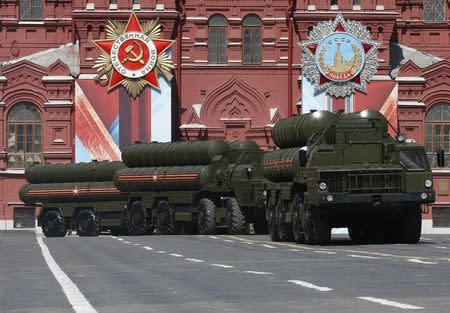Lower defence output saw Russia undershoot GDP target in 2017

By Andrey Ostroukh and Darya Korsunskaya
MOSCOW (Reuters) - A drop in Russian defence sector spending contributed to a surprise slump in the economy at the end of 2017, analysts and officials said, which has dampened an expected economic recovery before the March presidential election.
Russia's oil-dependent economy was seen officially as growing by at least 2 percent last year, bringing welcome relief to voters still feeling the pinch of a two-year recession ahead of the March 18 vote.
But data from the state statistics service this month showed gross domestic product (GDP) grew only by 1.5 percent in 2017 after industrial output - a major component - unexpectedly fell 3.6 percent year-on-year in November.
Industry analysts and government officials, some of whom spoke on condition of anonymity because they were not authorised to talk to the media, told Reuters the collapse in industrial output was caused by a slowdown in Russian defence spending.
Some of the people Reuters spoke to have access to official data on defence spending which covers expenditure on arms and equipment and which the government does not make publicly available.
"We have lived through a rather serious economic downturn in the second half of 2017," said Kirill Tremasov, who previously ran the economy ministry's forecasting department and is now head of research at Loko-Invest.
"There was a slump in industrial output, apparently in the defence sector, which was affected by a fall in state defence procurement," he said.
The fall in defence spending appeared to be a technical hiatus as the government switches from one procurement programme to another.
The previous defence order programme ended at the end of 2017 and the new one, to run from 2018 to 2027, has yet to be signed off by Putin.
Exact defence spending figures are a state secret in Russia, but military officials have said the government planned to spend more than 1.4 trillion roubles ($24.15 billion) in 2017.
A government official said overall state spending on defence orders was lower in 2017 than the previous year.
"In the second half of the year, everything connected to the military - aviation, ship-building, and non-public spending - fell very severely," he said.
SECRET SPENDING
The economy ministry said the fall in GDP in late 2017 was driven in particular by lower nuclear fuel output and the "production of other transport vehicles and machinery."
The industry and trade ministry did not address a question about the impact of defence production on the fall in industrial output, but said the decline was caused by a number of factors, including a global deal to reduce oil output and unseasonably warm weather.
"It would not be right or correct to talk now about some kind of long-term tendencies in industrial production," the ministry said, reiterating a forecast for 1.5-2 percent growth this year.
Andrei Klepach, a former official at the economy ministry and now chief economist at state development bank VEB, said investment in the categories of 'state management and military security' fell 38 percent in the third quarter after growing 52 percent in the second quarter, in year-on-year terms.
That was reflected in a fall in production of military equipment, among other areas, he said. Klepach declined to elaborate further on the breakdown as the information is classified.
An analyst at a major state bank in Moscow said state spending on the defence sector totalled 3.1 percent of GDP in 2017, down from 4.4 percent in the previous year.
"Industrial output did not accelerate in late 2017 as there was no support from state defence procurement," he said. The defence ministry did not reply to a Reuters request seeking a comment.
($1 = 57.9655 roubles)
(Additional reporting by Gleb Stolyarov and Polina Nikolskaya; Writing by Jack Stubbs; Editing by Katya Golubkova and Richard Balmforth)

